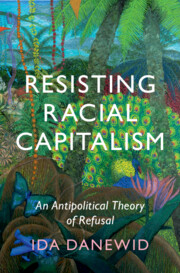Book contents
- Resisting Racial Capitalism
- LSE International Studies
- Resisting Racial Capitalism
- Copyright page
- Dedication
- Epigraph
- Contents
- Figures
- Acknowledgements
- Introduction
- 1 A Most Bourgeois Ambition
- 2 Ode to Utopia
- 3 War on Dirt
- 4 Maps of Apartheid
- 5 Of Plunder and Property
- 6 It Runs in the Family
- Conclusion
- Notes
- Bibliography
- Index
3 - War on Dirt
Published online by Cambridge University Press: 16 November 2023
- Resisting Racial Capitalism
- LSE International Studies
- Resisting Racial Capitalism
- Copyright page
- Dedication
- Epigraph
- Contents
- Figures
- Acknowledgements
- Introduction
- 1 A Most Bourgeois Ambition
- 2 Ode to Utopia
- 3 War on Dirt
- 4 Maps of Apartheid
- 5 Of Plunder and Property
- 6 It Runs in the Family
- Conclusion
- Notes
- Bibliography
- Index
Summary
Chapter 3 examines policing as a street-level form of governance which is central to racial capitalism. Focusing on the murder of Marielle Franco and police violence in Rio de Janeiro, it argues that policing functions as an ongoing war on groups and communities deemed wayward, delinquent, and undeserving: what I describe as a ‘war on dirt’. From Rio to London, Ireland to India, policing has been a key mechanism through which the state orders bourgeois society. Policing thus understood is a dirt-producing system which orders as it rejects, sanitizes as it represses. Drawing on afro-feminist quilombismo and recent work on black anarchism, the chapter argues that the struggle for police abolition must be anarchised and extended to target the racial capitalist state as a whole. Viewed antipolitically, abolition requires a break, not just with carcerality, but with state logics and governance in its entirety.
- Type
- Chapter
- Information
- Resisting Racial CapitalismAn Antipolitical Theory of Refusal, pp. 59 - 80Publisher: Cambridge University PressPrint publication year: 2023

